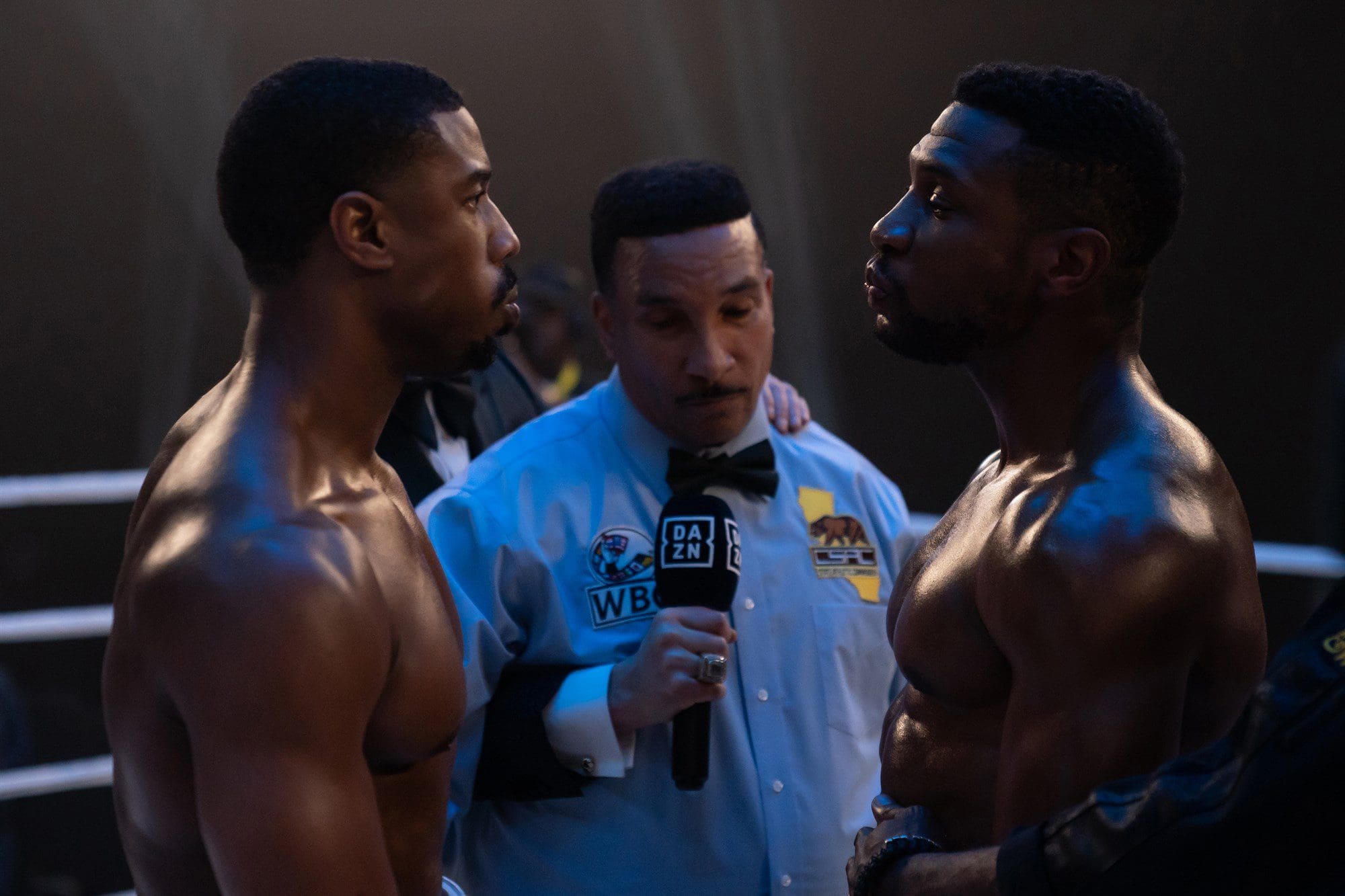
It’s easy to forget the Rocky franchise started out as a fairly simple melodrama. Driven by its central love story and the titular boxer’s will to succeed, the Oscar-winning film is softer than people remember because of its hyperbolic sequels. Likewise, writer-director Ryan Coogler’s first Creed film was a character-driven affair that turned Sylvester Stallone’s Rocky into a mentor for Michael B. Jordan’s Adonis “Donnie” Creed, the illegitimate son of his former rival and eventual friend, Apollo Creed (Carl Weathers). Both movies subverted expectations of masculinity, allowing their leads to voice their insecurities and revealing them to be surprisingly tender romantic heroes. And while Creed III is certainly operatic in scale, it succeeds because it’s grounded in character dynamics.
The film opens with Adonis becoming the heavyweight champion of the world only to retire immediately after. Now, a few years later, he’s running his own gym and cultivating a new generation of fighters. He and Bianca (Tessa Thompson) have raised a bright and feisty daughter (Mila Davis-Kent), they live in a mansion with a spectacular view of Los Angeles and they both have successful careers. Adonis is no longer the striver he was in the first two films. He’s in his imperial phase. However, he’s thrown off balance when his old friend, Damien Anderson (Jonathan Majors), reappears. Fresh out of prison and desperate to kickstart his boxing career before he gets too old, Damien asks for Adonis’s help. Unfortunately, Damien is not the loyal friend he once was and Adonis is forced to confront past traumas and reconsider whether his boxing days are really over.
Creed III hinges on the dynamic between Jordan and Majors and they’re brilliant together from their very first scene. Adonis’s well-earned confidence disappears, replaced by wariness and a tinge of shame. Damien, meanwhile, seems almost bashful, only betraying his pride when he refuses Adonis’s attempt to give him money. You can feel both men sizing each other up and though they never seem to fully trust each other, they do eventually shift into a believable friendship. Indeed, when Damien comes to dinner at Adonis’s home, Majors so easily folds into the established character dynamics (particularly a surprising yet satisfying directness with Thompson) that you almost wish the relationship didn’t have to sour for the sake of the plot.
Still, sour it does and Jordan (in his directorial debut) at least treats the rivalry with appropriate gravitas. For one, Creed III is gorgeous to behold. With cinematography by Kramer Morgenthau, the film’s lush colors and rich lighting give it a blockbuster sheen. When Felix (Jose Benavidez) enters a fight preceded by a smoke-wielding man in a suit and a skull mask, it’s so glossy and energetic, it feels almost like a musical number. Every entrance is equally theatrical, as if each boxer is really a superhero — perhaps even something like Jordan’s own entrances in the MCU. And honestly, that’s not a bad comparison. Adonis and Damien’s rivalry is so stark in its representations of good and evil that even their clothes in their climactic battle reinforce the dynamic: Adonis in white and Damien in black.
And if Creed III were just a simple tale of heroes and villains, it would be fun to watch if not terribly meaningful. Luckily, Keenan Coogler and Zach Baylin’s script is much smarter than that. While Damien’s villainy is so extreme that it makes the ending almost predictable, the film doesn’t use Damien’s choices to fully dismiss his emotions. Because the details of what happened the night Damien landed in prison are meted out so slowly, the audience processes them in tandem with Adonis and it allows us to understand both his reluctance to revisit his trauma and Damien’s rage. Adonis may have achieved everything he wanted, but that doesn’t mean he doesn’t have to keep working on himself, and it’s satisfying to see a genre that could so easily slip into tropes of toxic masculinity deliver a lead character who learns to open up to the people in his life (particularly Phylicia Rashad as his adoptive mother). Would it admittedly be better if Adonis worked through those issues in therapy rather than in the ring? Maybe, but that’s not the kind of movie this is.
On some level, you could probably argue that every Rocky movie is about a battle between good and evil. What distinguishes them is how silly they are in conveying that idea. While Creed III certainly has its share of ridiculous moments, it mostly reads as a serious action movie for adults. It’s bolstered by two confident and captivating lead performances and a visual style fitting of its almost Shakespearean stakes. The franchise may be nearing its sixth decade and who knows how much life it has left, but Creed III proves it still has the capacity to surprise and move us.

